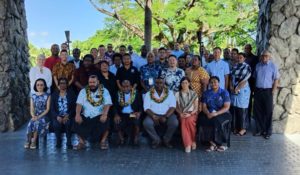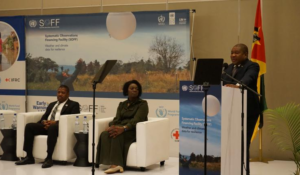5th SOFF Steering Committee Summary
The SOFF Steering Committee, the decision-making body of SOFF, met on 20-21 June, 2023 in Copenhagen. The adopted decisions respond to the ambition of the UN Secretary-General’s Early Warnings for All Initiative.
- Funding for 10 additional countries was approved and 22 countries were given the green light to start working on funding requests to close the countries’ basic weather and climate data gaps.
- More than 60 countries will be receiving SOFF support in 2023, including all initial countries for fast-track implementation of the UN Secretary-General’s Early Warnings for All Initiative.
- Important strategic decisions were taken, including on SOFF’s collaboration with the Green Climate Fund, Climate Investment Funds, Adaptation Fund, Global Environment Facility and the Climate Risk and Early Warning Systems initiative (CREWS)
- Belgium announced a EUR 6.68 million contribution to SOFF and becomes the 11th contributor to the SOFF UN fund that opened its doors for business in July 2022.
10 additional countries with significant weather and climate data gaps are receiving SOFF support
The countries represent areas of high priority to close the weather and climate data gaps for better weather forecasts and climate projections. These countries will receive technical and financial support to build human capacity, install the needed infrastructure to collect and share data, as well as to sustain operation and maintenance. Where infrastructure is already existing, SOFF will provide support to improve and rehabilitate. Global data sharing is what matters for weather forecasting and climate prediction models and will contribute to improving climate services, including early warning systems across the globe.
H.E. Fatumanava-o-Upolu III Dr Pa’olelei Luteru, the Chair of the Alliance of Small Island States (AOSIS), welcomed SOFF’s decisions to support additional countries and urged SOFF to implement strategic actions to ensure its effective collaboration with other multilateral climate funds, including on simplified and harmonized access of support.
SOFF work in 26 countries is advancing, and more than 60 countries will benefit in 2023
SOFF readiness work is already rapidly advancing in 26 countries with initial results on assessing the countries’ situation, in particular its basic weather and climate data gaps, and planning how to close these gaps. Advanced meteorological offices that are supporting SOFF beneficiary countries as peer advisors and the supported countries shared their early reflections at the meeting, highlighting encouraging experiences from the peer-to-peer advisory support, which is an important feature of SOFF.
Marianne Thyrring, Director of the Danish Meteorological Institute (DMI) emphasized that “At DMI we value the exchange of knowledge for us to grow as a meteorological community and to contribute to society. SOFF is exactly about this. Strengthening data exchange and sharing knowledge through the peer to peer approach. We are heartened by the warm welcome we have received from our Tanzanian colleagues”.
In his response, Ladislaus Chang’a, Acting Director General of the Tanzania Meteorological Authority, highlighted that “Already in the past we have worked closely together with DMI. It is great to see that the our relationship is renewed and strengthened through the SOFF programme and that we work together to close our basic weather and climate data gaps”.
The importance of SOFF’s peer-to-peer support was underlined by the Secretary-General of the World Meteorological Organization, Prof Petteri Taalas.

The Steering Committee also gave the green light to 22 countries to start working on funding requests for SOFF readiness support. With this decision, a focus is put on the Caribbean and the Indian Ocean Small Island Developing States (SIDS) to close an important gap in regions of critical importance for the global numerical weather prediction models, and further advances work in Latin America, Asia, and Africa.
SOFF as a delivery vehicle of Early Warnings for All
Selwin Hart, Special Adviser to the UN Secretary-General on Climate Action and Just Transition, underlined the importance of SOFF as delivery vehicle the Early Warnings for All and the urgency to ensure full complementarity between SOFF and other multilateral climate funds. He welcomed the Steering Committee’s decision of expanding SOFF support to all the Early Warnings for All initial countries for fast-track implementation. ”SOFF’s work in scaling up investments to enhance basic weather and climate data and systematic observation is vital for the UN Secretary-General’s Early Warnings for all Initiative. The effectiveness of any early warning system depends on the quality of data it is built on”, Mr Hart emphasized.
Role of SOFF within the multilateral climate finance
The Steering Committee also took important decisions related to SOFF strategy and vision, including the decision to develop a framework of complementarity and joint actions with the Green Climate Fund, Climate Investment Funds, Adaptation Fund, Global Environment Facility. The meeting also requested the SOFF Secretariat to prepare a proposal for how SOFF could potentially expand its financial and technical support to Middle-Income Countries in a phased and prioritized manner.
Henry Gonzales, Executive Director a.i. of the Green Climate Fund emphasized that “The complementarity between GCF and SOFF is particularly important. Through SOFF support, countries seeking funding from GCF are enabled to make effective evidence-based climate policy and investment decisions underpinned by high-quality climate data and products”. He highlighted that while SOFF will support countries to comply with the Global Basic Observing Network GCF will provide the investments in the later phases of the early warning value chain.
A crucial area of collaboration is the support from other funds to strengthen the capacity of countries to take advantage of improved forecasted products. Florence Rabier, the Director-General of the European Centre for Medium-Range Weather Forecasts (ECMWF) and Daniel Gellens, ECMWF Council President, presented a set of areas of capacity building and technical support they could provide to SOFF-supported countries in collaboration with major climate funds.
Support is growing as Belgium announced a significant contribution to the SOFF UN fund
Belgium’s Minister of Development Cooperation and Major Cities, Caroline Gennez, announced a contribution in the amount of 6,68 million Euro to the SOFF UN fund. Belgium becomes SOFF’s eleventh funder along with Austria, Denmark, Finland, Netherlands, Norway, Ireland, Iceland, Spain, USA and the Nordic Development Fund and increases SOFF’s capitalization to USD 72 million.
All SOFF Steering Committee decisions and documents can be found here.
About
Systematic Observations Financing Facility (SOFF): SOFF is a UN specialized fund co-created by WMO, UNDP and UNEP to close the climate and weather observations data gap in countries with the most severe shortfalls in observations, prioritizing Least Developed Countries (LDCs) and SIDS. SOFF provides long term financial and technical assistance to support the acquisition and international sharing of basic weather and climate observations, according to the internationally agreed Global Basic Observing Network (GBON) regulations. SOFF is a foundational element and delivery vehicle of the UN Early Warnings for All Initiative. SOFF Steering Committee members and partners are working on intense fundraising efforts to ensure rapid GBON implementation in all the countries with the largest capacity constraints.
Global Basic Observing Network (GBON): GBON paves the way for a radical overhaul of the international exchange of observational data, which underpin all weather, climate and water services and products. GBON sets the requirements for the aduisition and exchange of basic surface-based observing network designed, defined and monitored at the global level. GBON will improve the availability of the most essential surface-based data, which will have a direct positive impact on the quality of weather forecasts, thus helping improve the safety and well-being of citizens throughout the world.
SOFF Steering Committee: It is the decision-making body of SOFF. It consists of Funders, SOFF co-creators (WMO, UNDP, UNEP), beneficiary countries representation (AOSIS and LDC Climate Change) as well as CREWS. The Steering Committee provides strategic direction, considering the recommendations from the Advisory Board, reviews and adopts the SOFF work programme, as well as approves funding requests and the budget for the operation of the SOFF Secretariat.
YOU MAY ALSO LIKE...






